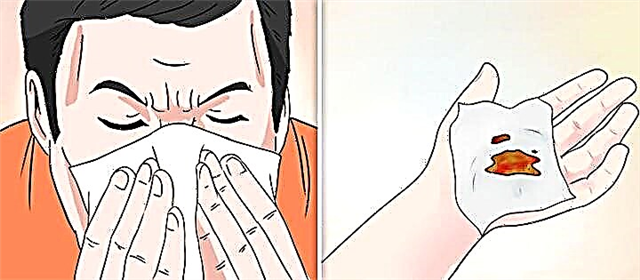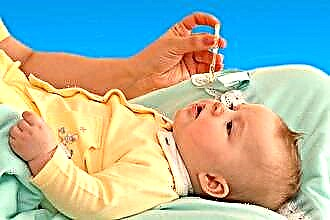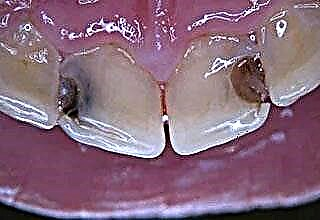Causes
 If you have a headache and nosebleeds, it is important to find out the cause of these symptoms, as they may indicate a rather serious illness. However, despite the apparent danger, headache and nosebleeds can appear even as a result of severe fatigue, sudden changes in pressure or alcohol abuse.
If you have a headache and nosebleeds, it is important to find out the cause of these symptoms, as they may indicate a rather serious illness. However, despite the apparent danger, headache and nosebleeds can appear even as a result of severe fatigue, sudden changes in pressure or alcohol abuse.
Therefore, before starting treatment, you should find out the cause of the unpleasant symptoms. To make a diagnosis, most often it will be necessary to carry out a number of simple manipulations: examining the patient, studying the anamnesis, measuring blood pressure, passing general blood and urine tests, etc.
Hypertensive crisis
This condition is accompanied by a strong increase in blood pressure (up to 220/120 mm Hg). The main signs of a hypertensive crisis are:
- dizziness;
- swelling of the face;
- deterioration of vision;
- noise in the ears and head;
- nausea, vomiting;
- headache;
- bleeding from the nose;
- tachycardia.
Health problems due to pressure drops can occur in divers descending to depth, climbers, when climbing to the top of a mountain. Whereas jumps in atmospheric pressure affect the condition of people of all professions and ages.
To avoid complications (damage to internal organs, such as the heart, blood vessels, etc.) resulting from a sharp jump in pressure, you should observe bed rest and immediately take medications (Captopril, Lisinopril), which will help to gradually normalize the patient's condition.
Important! Damage to internal organs during a hypertensive crisis can develop both at the maximum values of blood pressure, and at its too rapid decrease.
Inflammatory processes
With inflammation of the upper respiratory tract, nasal congestion often develops, accompanied by headaches and general malaise. In this case, the pain and sensation of heaviness will increase with tilting the head. There are also factors that provoke vascular damage (capillary fragility increases, their elasticity is lost) and bleeding:
- excessive dryness in the nasopharynx;
- frequent blowing out;
- long-term use of vasoconstrictor drops.
As a preventive measure, the nasopharyngeal mucosa should be regularly moistened, preventing it from drying out, and treatment should be directed to fight the underlying infection.
Trauma
Various injuries to the head, neck, brain (concussions, bruises, compression of the brain) can cause migraines and epistaxis. If the injury is insignificant, then the headache will be especially acute only in the first minutes, after which it will gradually disappear without the use of medications.
In this case, along with headaches and nosebleeds, symptoms such as:
- nervousness;
- dizziness;
- violation of concentration of attention;
- sleep problems.
Sometimes signs of epistaxis can occur when a foreign object enters the nasal passage, which most often happens in childhood. In such situations, you must immediately contact a specialist and follow his instructions.
Allergic reactions
Various allergic reactions can cause:
- rhinitis;
- sneezing;
- migraine;
- dizziness;
- itching, rash.
In this case, the headache will be a nonspecific, but quite frequent reaction of the body to the effect of an allergen.
Most often, migraine will occur with allergic reactions resulting from inhalation of pollen from various plants, highly dusty air, or being in a room with pungent odors. In this case, severe swelling of the nose, rhinitis often occurs, a large amount of mucus accumulates, which can provoke severe headaches.
As a treatment for allergic reactions, first of all, it is necessary to try to eliminate the cause of the allergy, and then use antihistamines (Suprastin, Loratadin, Prednisolone).
Diseases of the blood and blood vessels
Various pathologies and diseases of the blood and blood vessels can cause nosebleeds and migraines.
- Infectious diseases (chickenpox, flu, rubella), vasculitis, lack of vitamins (especially vitamin C) can cause increased fragility of the walls of blood vessels, as a result of which they are damaged even due to slight tension.
- Emotional and physical overload, chronic kidney disease, adrenal tumor, heart disease and other diseases can cause an increase in blood pressure, and as a result of rupture of the capillary walls.
- Disorders in the mechanism of blood clotting (hemophilia), leukemia, a decrease in the number of platelets in the blood, cirrhosis of the liver affect blood clotting and increase the risk of epistaxis.
Most often, nosebleeds are unilateral, but in severe cases, when one nostril is full, the blood can pass into the other.
Treatment
At the first signs of migraines, accompanied by epistaxis, the patient should be given emergency care. First, you need to stop the bleeding, and then take measures to reduce headaches. Necessary:
- place the victim in a reclining position (the head should be located above the level of the heart), turning her head to one side, unbutton the tight collar, remove the tie or scarf, providing a free flow of air;
Important! With nosebleeds, it is forbidden to throw your head back so that the discharge does not enter the respiratory tract and esophagus.
- stop the blood using any means at hand (put ice or a cold compress to the bridge of the nose, but for no more than ten minutes) and medications (Vikasol);
- apply a cold wet towel to the back of the neck;
- reduce migraines using analgesics (Analgin, Paracetamol, Ibuprofen);
- call an ambulance.
Important! With severe bleeding, accompanied by migraines, disturbances of consciousness, speech, vision, body numbness, nausea and vomiting, self-medication is unacceptable.
If the above methods turned out to be ineffective, and the bleeding could not be stopped, you can try to instill vasoconstrictor drops (Nazol, Evkazolin) into each nasal passage, holding the nostrils for a few seconds so that the medicine does not flow out immediately.
 Experts distinguish between two main types of epistaxis: anterior, posterior.
Experts distinguish between two main types of epistaxis: anterior, posterior.
- Anterior bleeding is less intense, so it often stops on its own or after basic simple measures to help in situations where the head hurts and nosebleeds.
- Posterior bleeding is often caused by damage to large capillaries. Bleeding is more intense and there is a risk of large blood loss. Often it is impossible to stop blood loss on your own; specialist medical assistance is needed.
Important! If seizure recurrence occurs frequently enough, accompanied by severe pain and bleeding, more sophisticated surgical treatment is likely necessary.
Contraindications and prevention
With abundant epistaxis, it is prohibited:
- throw your head back and take a horizontal position, which can cause more active blood flow and its flow into the trachea and esophagus, provoking vomiting and even suffocation;
- blow your nose to avoid increased bleeding as a result of the displacement of the formed clots.
Preventive measures that will help reduce the risk of migraines accompanied by bleeding from the nose include:
- excluding too hot food and drinks from the diet, active sports for a week after severe nosebleeds, which can provoke additional rush of blood to the head and cause relapse;
- taking medications aimed at strengthening the walls of blood vessels (Askorutin, Angistak, Venoruton);
- eating food useful for blood vessels - olive oil, fish, seafood, legumes, cereals;
- the use of vitamin complexes containing vitamins C, A, E, K, PP, B vitamins;
- minimizing the risk of head injuries.
It is important to start treatment on time, determining the cause of the unpleasant symptoms, since they may be signs of other, more dangerous conditions, such as stroke, meningitis, brain tumor, hypertensive crisis, etc.



